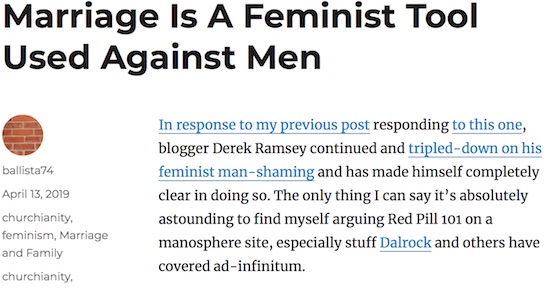
I’ve been enjoying the ongoing debate about marriage between Derek and Ballista. It’s important for men to discuss these things openly, and it’s difficult to open up dialogue on this subject in a society as thoroughly saturated with feminism as ours is today.
In the first place, I commend Ballista for being tactically proficient in his rebuttals to Derek. Rather than squawk out ten thousand words in the comment section here, he crafted some detailed responses and posted them on his own blog (linked in the sidebar). I’d encourage everyone to go read his latest article, as I’m going to be using it as an example of shoddy thinking and poor rhetoric immediately. In the process, I’ll be providing counterexamples to his stated thesis: that marriage is a conspiracy by feminists. It ought to be easy to demonstrate that not only is Ballista wrong, but that the opposite is, in fact, the case.

Ballista writes:
In response to my previous post responding to this one, blogger Derek Ramsey continued and tripled-down on his feminist man-shaming and has made himself completely clear in doing so. The only thing I can say it’s absolutely astounding to find myself arguing Red Pill 101 on a manosphere site, especially stuff Dalrock and others have covered ad-infinitum.
That’s certainly a bombastic introduction. I’ve read all of Derek’s articles that have been posted to this blog carefully. Derek has not promoted feminism, and he hasn’t shamed men. Lately, he hasn’t even criticized me, even as I post lurid details of my latest immoral Tinder flings.
While it’s become obvious that blue-pill won’t ever turn into red-pill in Ramsey’s ridiculous assertions regarding my positions, I thought it might be enlightening to others to attempt to explain the role that marriage plays within feminism.
I have always argued, marriage and family are concepts created by God as a building block of society.
Both Derek and Ballista have promoted the ahistorical notion that marriage was created by their god. The obvious problem with this is the fact that marriage existed many thousands of years before the god of Protestant Christianity did.
Marriage predates Christianity.
Marriage predates Judaism.
Marriage predates western civilization.
Not only is Ballista and Derek’s god not the creator of marriage, it could easily be argued that Ballista and Derek’s god is the destroyer of it. Marriage was a much healthier institution in ancient Sumeria than it is in our society.
As a fun side-trip, let’s see what Ballista’s god has done to the concept of marriage…

Not only did Ballista’s god have nothing to do with marriage, it’s plausible to assume that no other god did, either. There is lots of evidence to suggest that men and women were biologically designed to pair bond and raise children together. Human beings were probably doing this before we ever dreamt up religion. This makes sense, in the context of human childbirth, which is abnormally tedious and traumatic, compared with other species. It also stands to reason, given the fact that human beings are born almost totally helpless, and aren’t even able to run before three or four years old. If you’re down for some peer-reviewed articles, this volume is a good place to start.
Ballista spends a bit of time being overly eristic, so I am skipping ahead a few paragraphs to the point where he pretends to rebut one of Derek’s contentions.
Now if we take Ramsey’s suggestion that men just need to man up and marry those thots to fight feminism, it becomes ludicrous on the face of it.
Ballista is striking down a straw-man of his own creation, which doesn’t help him make any salient point. If anything, it makes his entire argument much weaker.
To review, Derek has never told any man to marry. What Derek has done is to accept the reality extant in human beings: We are hard-wired to couple up and raise families together.
My readers will note that even I don’t try to tell men not to marry. Doing so would be futile, and it’d likely make my audience less likely to take my advice. I know that most men are going to marry, because that’s what human males are born to do. I just try to encourage the young brothers to take a bit of time between falling in love, fucking, and signing on the line that says ‘chump.’
I or any other man can’t make marriage into what they want or what God wants, even if one finds the rare unicorn that is both actually fit for marriage and doesn’t believe the world revolves around her.
Ballista’s god wants marriage to look like this:

In contrast, Derek seems to want marriage to look like this:

Since men are going to marry anyway, I tend to take Derek’s side in this squabble. I’d much rather live in a society full of families like this one.
The legal system has set itself up to unilaterally define the parameters of marriage and put the full force of itself against those who would violate those parameters. Anything reflecting God’s word is automatically considered “abusive” in the eyes of society and of the divorce courts. There is no amount of game or “keeping frame” or otherwise that will change or stop this. Notably, this leads to the issues of no-fault divorce, the Duluth Model, child support, alimony, and the like when the woman finds her man unfit or she gets bored or “unhaaaaappy” in the marriage. Ramsey or anyone else has no answers for the men they bid to walk into the meat grinder when these men get served with their divorce papers. They will be long gone when that happens, just like others will for those that think they can avoid feminist control and yet be married.
I’m not an expert on Derek’s blog. When I go over there I get an eyeful of technical articles that don’t seem to interest me. Maybe Derek is “walking men into the meat grinder” elsewhere, but I’ve never seen it. I know that he hasn’t written anything like that here. Moreover, Derek’s articles on my blog are inherently informed by all my articles on divorce, alimony, child support, and female misbehavior. If Ballista is implying that such articles don’t exist at V5K 2C2 (he seems to be) then he hasn’t read the archive.
As I just illustrated, there’s no such thing as a “good marriage”.
While Ballista accuses Derek of being a feminist, this blanket condemnation perfectly coheres with traditional feminist ideology. Don’t believe me? Just ask the sisterhood…
- Andrea Dworkin wrote that marriage was an institutionalized form of rape.
- Marlene Dixon wrote that marriage was inherently “oppressive.”
- Simone de Beauvoir wrote that marriage ought to be outlawed.
So many feminists wrote logical equivalents to Ballista’s proposition, that it’s hard to believe he’s not trolling me.

In sum, this is what a feminist society looks like:

No fathers. No husbands. No marriage. Just skanks who fuck everyone, and who will breed with anyone, doing what skanks do, all in front of their bastard kids.
As for men that have red-pilled themselves, the words and the actions are going together. In addition to speaking out, they are avoiding entanglements with women that will lead them onto the plantation. They see feminism for what it is and how it affects society, and especially marriage. Sadly so few men do, and still function to uphold and perpetuate feminism.
Earlier in his article, Ballista talked about something he called the ‘solipsistic fallacy,’ and as though to prove his point, he immediately put his own solipsism on display.
The men who have “red-pilled themselves,” in Ballista’s analysis, will never be the majority. As we have already seen, men are hard wired to pair-bond and settle down with women. The fact that Ballista is bright and self-aware enough to see and appreciate the risks of marriage implies, to him, that every swinging dick will be able to gain the same clarity. That’s a huge mistake on his part.
It’s also a fact that most people enjoy being miserable. Freud explained this already, and in detail. Even if Ballista were able to convince the average Joe that marriage was a bad bargain, the same dummox would turn around and marry anyway, and he’d spend the rest of his life patting himself on the back for his meaningless sacrifice — while hating Ballista for telling him the truth.
That said, barring anything fantastic, this is the last thing I’m going to write on this particular issue.
I think this is a good place to end things, and I’m grateful to everyone involved for raising so many interesting points.
One final note: Ballista began his article praising Dalrock, and he subsequently wrote an article that looked like Dalrock could have written it. I enjoy Dalrock’s cheap theatrics; but, such things are only effective against the simple minded (works great on Tumblr feminists). Dalrock is a very shallow thinker, and his articles regularly fail to convince his critics of anything. Ballista clearly has the capacity for a much higher level of proficiency, and I expect to see rapid improvement at his blog, which I already enjoy reading.
 A rare unicorn, spotted in Costa Rica
A rare unicorn, spotted in Costa Rica






 (re)productive capital
(re)productive capital




 (modified from this
(modified from this  The undead Ramsey family
The undead Ramsey family

 Stand strong amid life’s tides
Stand strong amid life’s tides Artisanal Toad is the latest to fall
Artisanal Toad is the latest to fall Don’t follow the light at the end of the tunnel
Don’t follow the light at the end of the tunnel It might be beautiful, but it’s still isolated.
It might be beautiful, but it’s still isolated.

